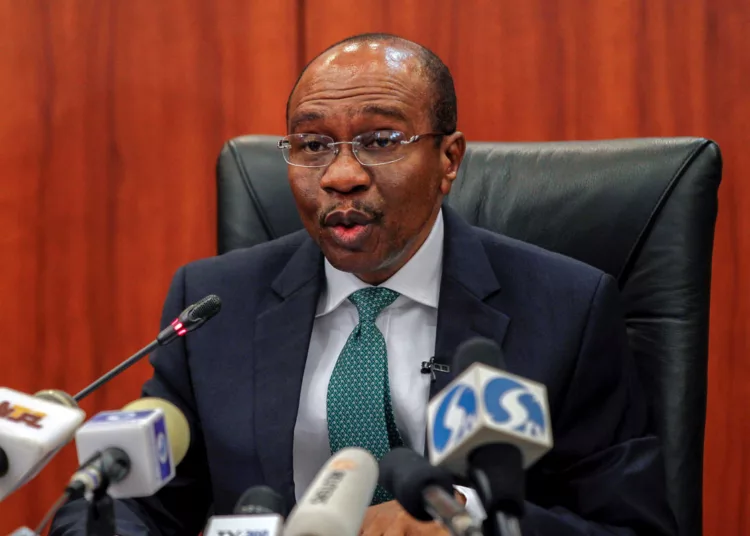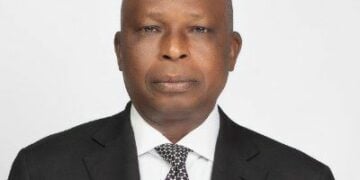Against expectation, the Central Bank of Nigeria (CBN) has said the January 31, 2023 deadline for the higher denominations of old banknotes to cease to function as legal tender remains sacrosanct.
Many had expected the CBN to extend the deadline beyond the January 31 date for the sake of Nigerians in riverine areas, uplands and other remote areas who do not ordinarily have access to banking services in their immediate locations.
CBN governor, Mr Godwin Emefiele, had insisted the apex bank was going ahead with the set date, saying the 100 days allowed for the public to return the old notes to commercial or other banking agents across the country was enough time for compliance.
“For us, 100 days are enough for anybody who has the old currency to deposit the money in the banks. And we took every measure to ensure that all the banks are open and receive the old currencies. 100 days, we believe, are more than adequate. We do not see any reason to begin to talk about a shift because people could not deposit their old monies in the banks,” Mr Emefiele stated yesterday during a media briefing to announce the decisions of the Monetary Policy Committee meeting of the apex bank.
Apart from the nationwide sensitization on the redesigned banknotes, the CBN had also commissioned currency swap to encourage compliance with the policy. With that, the banking agents exchange the new notes with the old ones.
The CBN governor said about N1.5 trillion had been recovered from circulation as of last week, adding that he expects the figure to rise to N2 trillion before the January 31 date.
He pleaded with all Nigerians to return all the old N200, N500 and N1000 notes in their possession to their host banks or nearest banking agents to avoid losing the money completely.
Emefiele said there is adequate quantity of new notes available, but urged understanding with the fact that it is a process. He said the banknotes are being supplied to the commercial banks as the Nigeria Printing and Minting company produces them.
On the complaint that some Nigerians in the riverine and upland areas do not have access to banking activities to deposit the old notes, Emefiele said CBN has 1.4 million touchpoints of its super agents across the country to conduct cash exchanges for them.
“We cannot allow them to be banks in their homes. They don’t have the licence to build bank vaults in their homes. They should bring those cash back to CBN because they are undermining monetary policy. They are keeping those monies to speculate against our currency and they are making our work difficult in CBN,” Emefiele stated yesterday in Abuja.
Meanwhile, the MPC took a decision along the global trend yesterday to tighten the Monetary Policy Rate (MPR) by 100 basis points in continuation of its measure to rein in inflation and enforce money control stance.
By that, the interest rate benchmark was increased from 16.5 percent to 17.5 percent. The committee held other parameters around the MPR.
Addressing journalists at the end of the MPC meeting, the CBN governor said the little drop in inflation rate from 21.47 percent to 21.34 percent in December was not enough to hold or reduce the interest rate.
MPC based its decision on the fact that the economy remains confronted with the risk of high inflation with adverse consequences on the general standard of living.
“One members voted to increase the MPR by 150 basis points, four members by 50 basis points and seven members by 100 basis points. In summary, MPC voted to raise MPR to 17.5 percent,” the CBN governor said.
The apex bank thinks a loosening would negate the objective of damping pent-up aggregate demand which fuels inflation.
In Plateau State, the CBN urged traditional and religious leaders to sensitise their people to deposit their old currency notes in banks to obtain the new naira notes, saying the January 31 deadline is sacrosanct.
The director, payment systems management department, CBN, Mr. Musa Jimoh, made the declaration in Jos, the Plateau State capital, while addressing newsmen on the level of compliance by banks in dispensing new notes in the state.
He explained that the redesigning of currency is a national project as a result of the circulation of fake notes and stressed that the apex bank had lost count of the total money in circulation because the money had been withdrawn and kept in different homes for several years .
Jimoh pointed out that the global best practice is that within five years a country should have its currency redesigned, and that it is almost nine years since the last one was issued.
“So it is about time we changed our currency. That is why this exercise was embarked upon,” he stated..
The CBN director also said the apex bank is fully involved and committed to ensure a hitch free exercise even as he urge traditional and religious leaders to carry the message to the hinterland whereas the bank’s officialls go round the banks to ensure that all ATMs dispense new notes in order to meet the January 31 deadline.
He disclosed that there are about 1.5 million agent outlets nationwide for effective dispensing of new notes, and that the CBN had provided new currency notes to all deposit money banks and agents, warning that banks should not put old notes in their ATMs.
Jimoh further revealed that the CBN is on the lookout for those who spray and stamp on Nigerian currency, adding that it is a serious offence for anybody to do that because currency is a symbol of our sovereignty.
Senate Seeks Extension of Deadline, Cash Limit
Meanwhile, the Senate yesterday called on the CBN to extend the cash withdrawal limits and the deadline for the use of the old naira notes from January 31 to July 31, 2023.
The upper chamber also urged the CBN to open an exchange window where people that do not have bank accounts can deposit their old notes.
The Senate’s resolution was sequel to a motion by Sen. Sadiq Suleiman (APC-Kwara) during yesterday’s plenary.
Suleiman recalled that the Senate, in its resolution on December 28, 2022, had earlier called on the CBN to extend the use of the old notes from January 31 to June 30, 2023.
He said the apex bank had insisted on stopping the use of the old naira notes by the end of January, lamenting that there was not enough new naira notes in circulation and calling for the date to be extended to July 31.
He said: “Experiences around the world have shown that such abrupt decisions, if not controlled, usually creates chaos. The Senate should extend the use of the old notes to July 31,” he said.
CBN Insists No Deadline Extension For Old Naira Notes, Increases Interest Rate To 17.5%
Supporting the motion, Sen. Ibrahim Hadejia (APC-Jigawa) said that the call for extension was for the benefit of their constituents and not for personal benefits.
“In my constituency, no Automated Teller Machine (ATM) is dispensing the new notes,” he said.
Similarly, Senator Adamu Aliero (PDP-Kebbi) said that the policy would inflict untold hardship on people living in the rural areas.
“The CBN governor should be invited,” Aliero said.
Senator Adamu Bulkachuwa (PDP-Bauchi) said that the extension was necessary otherwise there would be chaos.
Senator Biodun Olujimi (PDP-Ekiti), who ssid in her local government area, about 90 per cent of the people have not seen a glimpse of the new naira notes, called on the apex bank to “look away from the elections.”.
She said that if the date was not extended, it would lead to collateral damage which would not augur well for the economy.
Senator Mohammed Ndume (APC-Borno) called on the Senate to use its oversight responsibility on the CBN to order the apex bank governor to extend the date.
He said that the power of the Senate should not be played down, as he called on the senators to stand firm on the call for extension.
Senator Sam Egwu (PDP-Ebonyi), who was the only senator that opposed the motion, said: Nigerians do not have the culture of keeping their money in the bank.
“It is in Nigeria where cash is used arbitrarily; other countries use electronic means. Nigerians are just averse to change,” Egwu said.
Senate President, Ahmad Lawan, in his comment, said that most of the senatorial districts did not have banks.
“In rural Nigeria, there are no banks and people transact businesses with cash more often.
“There is no doubt that we must have a window for exchange. We must have policies by the CBN to have bank branches established in rural areas. We need this extension for the most ordinary Nigerians,” Lawan said.
The CBN had on October 26, 2022 announced plans to redesign the 200, 500, and 1,000 naira notes. Sequel to the announcement, President Muhammadu unveiled the redesigned naira notes in November, 2022.
The scenario was the same in the House of Representatives as the lawmakers decried the scarcity of new naira notes as the deadline to phase out the old notes draws nearer.
The House resolved that the Central Bank of Nigeria (CBN) should review its January 31 validity period for the old notes and extend the deadline by six months.
To this end, the House set up a 14-man ad-hoc committee headed by the House Leader, Alhassan Ado Doguwa, to interface with the CBN and Banker Committee today (Wednesday).
The meeting will ascertain the availability or otherwise of the new naira notes, which the CBN said were available.
The resolution was sequel to the consideration and adoption of a motion of urgent public importance moved by Sada Soli.
Sada in the motion urged the CBN to review the cashless policy, noting that the deposit money banks in Nigeria do not have what it takes to achieve the policy.
While agreeing that the cashless policy is in tandem with global best practices, Soli lamented that the CBN had refused to listen to the cry of the people to extend the timeline of the currency swap.
According to him, “the rigidity of the policy may affect the economy; therefore, the apex bank should keep its policy closer to reality. The policy, though good, will not be fair on the new government and will impact negatively on the macroeconomy”.
The House, however, called on President Muhammadu Buhari to intervene on the deadline issued by the CBN.
Traders To Reject Old Notes As CBN Begins Audit of Banks
Meanwhile, traders in Lagos have said they will begin rejecting the old N200, N500 and N1,000 notes by this weekend ahead of the January 31, 2023 deadline set by the CBN even as the apex bank said it will intensify efforts to push out the N200 notes.
The CBN has also said it will begin an audit of banks alongside the on-site monitoring to know those who are dispensing the new notes, and those who are not will be appropriately sanctioned. It had earlier noted that banks will be fined N1 million per day.
Most Automated Teller Machines (ATMs) that are dispensing the new notes only pay out the N500 and N1,000 notes, thus, causing a scarcity of the N200 note which is mostly used by petty traders.
Speaking during a sensitisation on the new naira notes by the CBN at the Asejere market in Makoko area of Lagos, the assistant Iyaloja of the market, Memud Iyabo Ajoke noted that traders in the market have been informed of the redesign of the currency and have been told to start rejecting the old notes from Saturday, January 28, 2023, three days to the deadline.
She explained that this is to ensure that they do not have the old notes with them by Tuesday, January 31 which is the deadline.
Addressing journalists during the sensitisation, deputy director, Banking Services department at the CBN, Josephine Ajala, said all efforts have been made to dispense the new notes.
“So surely, by the 31st, there cannot be any ATM machine that will dispense old notes.
“We just realised that, probably, people just want to be collecting or getting N1,000 notes. The banks have been instructed that all the denominations that were given must be dispensed. We are doing a lot of audit on them.
“We are following up seriously on them to trace and ensure that whatever we give them must reach the grassroots. So, all the denominations will get to the ATM and they should be in the ATM,” he stressed.





